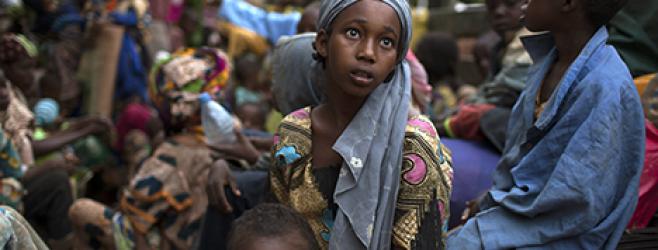

The existing international peacekeeping forces, including the French operation Sangaris and the African-led International Support Mission to the Central African Republic (MISCA) have not been able to contain the violence nor curb the flight of entire Muslim communities to neighboring countries. According to the latest UN estimate in early March, only 900 of 140,000 Muslims remain in Bangui, and those left behind fear for their lives. Dozens of towns and villages in the western third of the country, which once were home to thousands of Muslims, have been forcibly emptied of their Muslim population. Many homes, churches and mosques have been destroyed, as witnessed by Amnesty International.
The country is experiencing a total breakdown of law and order and there is complete impunity for serious crimes committed and being committed in CAR, including crimes against humanity like killings, sexual violence, looting, and the destruction of entire villages.
Meanwhile, tens of thousands of people forced to flee the violence in CAR are now facing another humanitarian catastrophe in neighbouring Chad and Cameroon. The rainy season is due to start shortly and unless shelter, food and medical facilities are urgently made available their already desperate situation will quickly deteriorate.
Increasing tensions and violence in the country are continuing to worry international observers. Areas of the capital Bangui have increasingly come under the control of anti-balaka militias, who have in recent days launched repeated attacks on civilians and African Union-led MISCA peacekeepers.
“This flare-up in violence is cause for serious concern, given the backdrop of ethnic cleansing, war crimes and crimes against humanity across the Central African Republic since last December,” said Christian Mukosa, Central Africa Researcher at Amnesty International.
“It is just further evidence of what Amnesty International has been saying for months – that the small contingent of peacekeeping troops on the ground will not be able to protect civilians effectively without more help from the international community.”
Since 22 March 2014, the Red Cross has recorded at least 15 civilian deaths in Bangui, and the NGO Médecins Sans Frontières has treated almost 40 people for life-threatening wounds sustained in attacks. A MISCA peacekeeper was killed in the town of Boali, 80 km from the capital, and several more have been injured in a number of anti-balaka attacks against MISCA personnel and assets in the capital since 23 March.
The brazen new attacks have taken place despite the installation of a transitional government in January 2014 and the presence of 6,000 African Union-led MISCA troops and 2,000 French soldiers.
On a recent visit to the country, UN High Commissioner for Human Rights Navi Pillay described a horrific situation. The abuses she denounced include the decapitation of children.
The UN Secretary General has proposed sending a 12,000-strong UN peacekeeping force to the Central African Republic, but it cannot deploy until September 2014.
As a stop-gap measure, on 10 February 2014, the EU promised the rapid deployment of up to 1,000 soldiers to the Central African Republic, as well as supplies and equipment to assist existing international forces on the ground. But the troops have not materialized despite repeated requests from high-level officials, including EU foreign policy chief Baroness Catherine Ashton.
Celé znění on-line petice, kterou posíláme adresátům.
A full deployment of EUFOR RCA in order to protect the civilian population in all parts of the Central African Republic.
Significant financial, logistical and political support reaches the African-led MISCA mission so they can live up to their mandate of protecting civilians in all parts of the country until the UN peacekeeping mission deploys.
Your Excellency,
I am writing to you express grave concern about conflict in Central African Republic (CAR).
Over the last few months, as Séléka forces retreated to the North, they have been committing gross human rights abuses against civilians, and anti-balaka militias have launched a relentless wave of attacks against Muslim communities.
The country is experiencing a total breakdown of law and order and there is complete impunity for serious crimes committed and being committed in CAR, including crimes against humanity such as murder, sexual violence, looting, and the destruction of entire villages.
Meanwhile, tens of thousands of people forced to flee the violence in CAR are now facing another humanitarian catastrophe in neighbouring Chad and Cameroon. The rainy season is due to start shortly and unless shelter, food and medical facilities are readily made available their already desperate situation will quickly deteriorate.
It is urgent that the international community coordinates efforts to assist the authorities to avoid a new humanitarian crisis.
In the light of the above described, I respectfully urge you, Your Excellency, to ensure that:
A full deployment of EUFOR RCA occurs in order to protect the civilian population in all parts of the Central African Republic.
Significant financial, logistical and political support reaches the African-led MISCA mission so they can live up to their mandate of protecting civilians in all parts of the country until the UN peacekeeping mission deploys.
Thank you for your attention to this important issue.
Your sincerely,